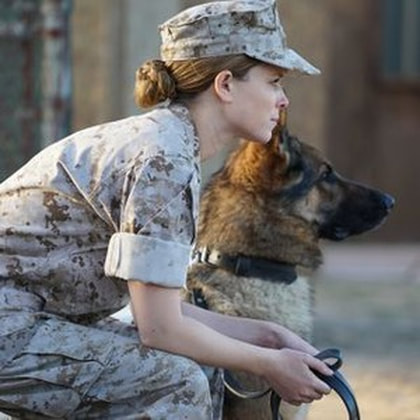D+ | The true-life story of a Marine and her bomb-sniffing war dog. Directed by Gabriela Cowperthwaite Starring Kate Mara Initial Review by Jon Kissel |

It’s a reasonable choice to backseat Megan’s professional life in favor of her familial one, but Cowperthwaite and writers Annie Mumolo, Pamela Gray, and Tim Lovestedt are satisfied with only scratching the surface. With their abilities, Whitford and Falco are able to snow the viewer into thinking there’s more to their relationships with Megan than there is. Whitford gives the dad a sadsack air of resignation and a quiet dignity and Falco gives the mom an overeager selfishness, but the parent-child relationship hasn’t progressed far beyond the surface dynamics of teen years. Doing minimal work with the family only serves to underline how much less is done with the military. There’s no care given to any military character, none of which feel specific or even have a defining character trait. PTSD is given one scene and then everything’s fine. The difficulty of insurgent warfare, where the pure and earnest curiosity of a little boy has to be viewed as a hostile threat, is skirted over, and Megan has no thoughts or conflicts about the war she’s in the middle of. Big decisions like why she leaves the service when she does or even why she signed up in the first place are elided.
If there’s little to no sense of camaraderie during boot camp and in Iraq, or interiority in general, there is some effective wartime filmmaking. While her accuracy leaves something to be desired, Kathryn Bigelow remains the master of tense bomb discovery and defusal. Cowperthwaite isn’t up to that stellar standard, but I was still impressed by what she captured onscreen. The centerpiece shootout looks to this layman like a coherent and thrilling depiction of an actual firefight. Most importantly, there’s a sense of geography to everything, such that it’s reasonably clear where fire is coming from and where the soldiers need to get to. Put supporting characters that I’m invested in into that scene, and it grows in estimation. It works as procedural filmmaking in that it makes a mysterious process a little more clear.
Despite its flaws and occasional successes, for human and dog stories, Megan Leavey achieves its goals. I spent a fair chunk of this film with a lump in my throat, even knowing that I was being manipulated with low-bar, elemental story-telling. Scenes of Megan and Rex being separated work, as does the big reunion at the end, as does the standard end credits of historical photographs backed up by Eddie Vedder. Cowperthwaite even shows some admirable restraint by not showing Rex’s death or funeral, as real Megan had less than a year with real Rex before he died. That kind of low-hanging fruit is going to be picked by most directors, and Cowperthwaite deserves points for skipping it. Megan Leavey mildly chokes me up with its tale of interspecies companionship, but a film needs to work on my head as much, if not moreso, than on my heart. C
 RSS Feed
RSS Feed